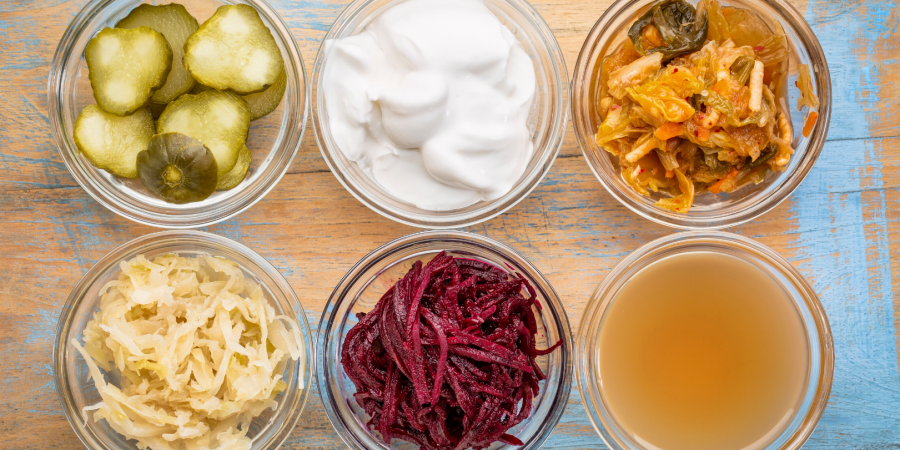As described in our previous blog, the health of your gut has a profound impact on your health. There are many lifestyle factors that you can implement into your life to support the healthy bacteria in your gut. Here are three at home recipes that utilize the fermentation process to support your gut.
Fermented foods: Creating Beneficial Bacteria
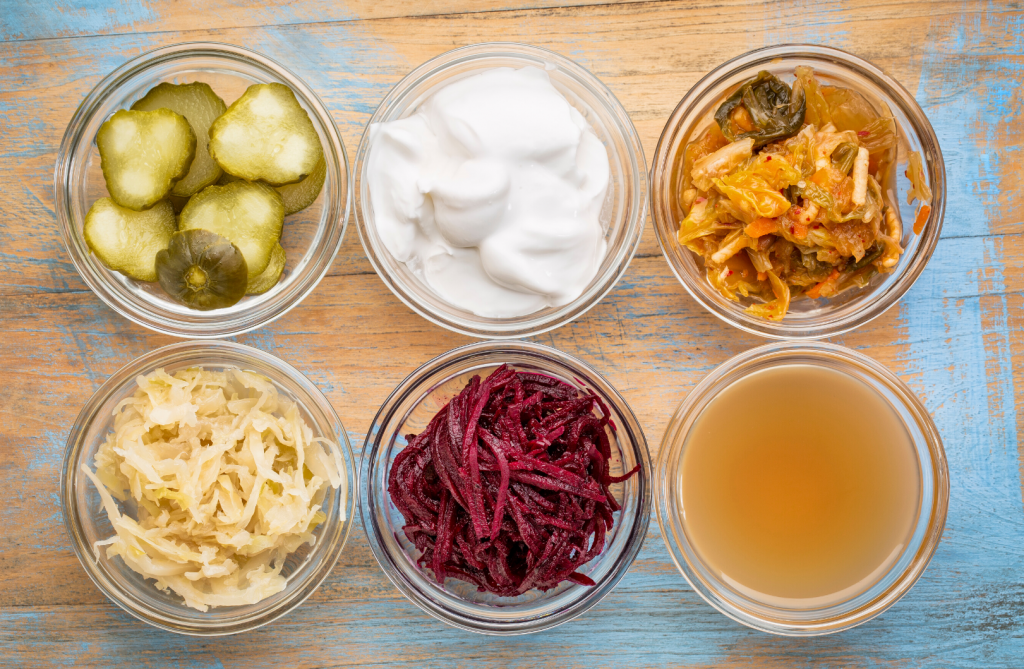
Fermentation occurs when microbes are given the opportunity to colonize and multiply. They do this by feeding off of carbohydrates and sugars. Many fermented vegetables and dairy products are enhanced with specific strains of bacteria to enhance taste and health benefits. However, you can also simply ferment your own food at home. In our previous article (link here) we talked about the benefits of probiotics.
This study discovered that Korean centenarians (people who live to be 100 years old) had sufficient b12 levels despite eating very little meat. The subjects in the study typically ate fermented foods at every meal and this study shows that certain bacteria can produce b12.
Try incorporating these recipes into your diet, you can strengthen your gut and absorb critical vitamins and minerals.
Recipes you can make at home
Coconut Yogurt Recipe
Coconut yogurt is an easy, dairy free alternative to getting probiotics. This thick and creamy yogurt is perfect with some fruit and granola for an easy breakfast. Making this is simple and only requires 2 ingredients.
Ingredients:
- 1 can full fat coconut milk
- 2-3 capsules probiotic
Directions:
- Empty 1 can full fat coconut milk into a clean glass jar or bowl.
- Top with a probiotic (You can do this by opening 2-3 capsules of probiotics). Stir for a while with a whisk to make sure it is properly mixed.
- Cover with a cheesecloth (Put a rubber band around the container to fasten)
- Allow the yogurt to sit for 24-48 hours and then refrigerate to thicken consistency.
- Enjoy!
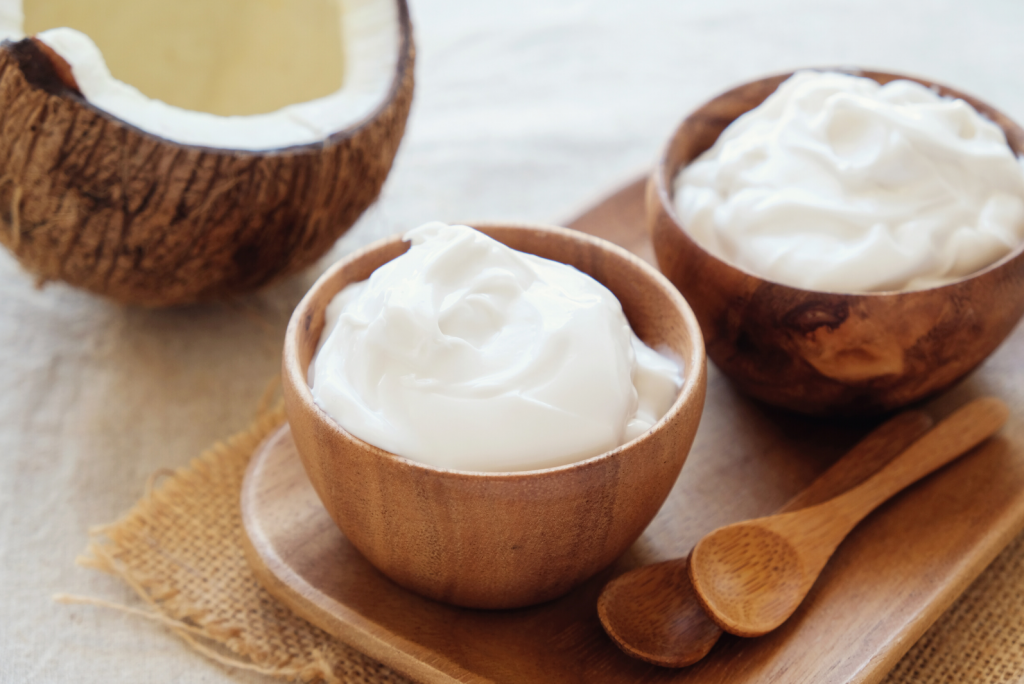
Some tips:
- Make sure you have a high quality probiotic. Aim for 20-50 billion CFUs per capsule.
- Use a wooden spoon to prevent disruption of the fermentation
- Use high fat yogurt with no added preservatives. You could try an unsweetened cream.
- This yogurt should have a fruity and tangy taste, but if the color, odor, or taste seems off, discard and try again.
- Separation may occur and simply drain the liquid and keep refrigerated for more thickness.
- This should last for up to a week and a half in the fridge
This yogurt is packed with essential probiotics and makes an easy dairy free alternative to your usual store bought yogurt. Try topping with some chia seeds, fruit, and granola for an easy breakfast parfait!
Sauerkraut
Ingredients:
- ½ head of cabbage
- 1 large carrot
- 2 beets
- Distilled water to cover
- 1 ⅔ teaspoon salt
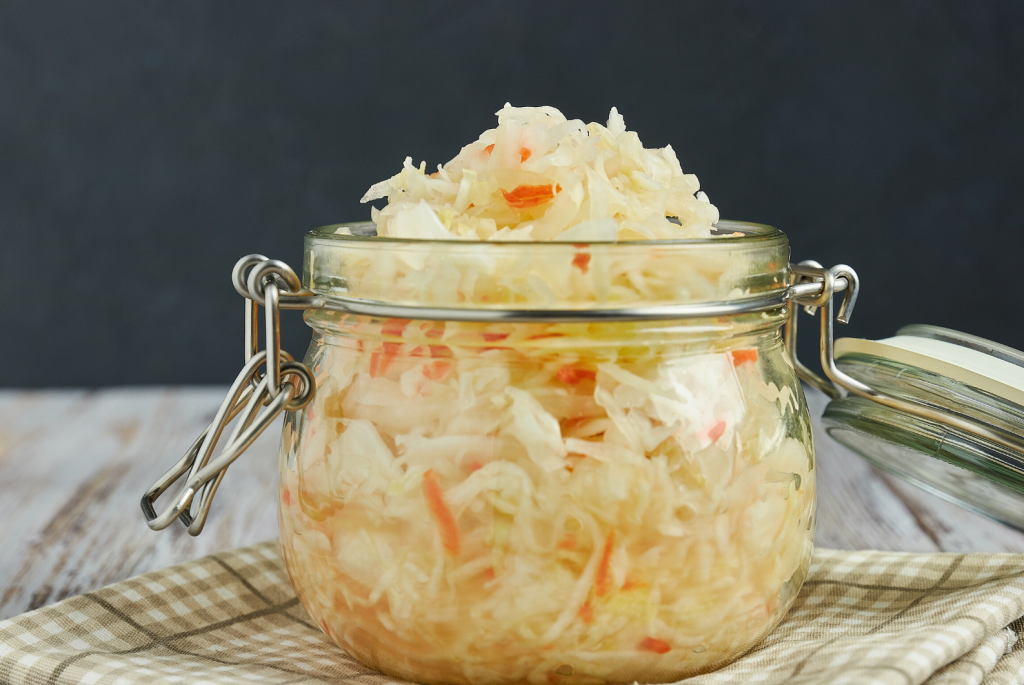
Directions:
- Wash and slice cabbage into thin strips and place into a large bowl.
- Peel and slice beets and carrots into thin slices (a peeler will work nicely) and add to the bowl with the cabbage.
- Add salt and pepper to season.
- With clean hands, squeeze the cabbage mixture to remove any excess water.
- Pack the cabbage mixture into a jar tightly and pour just enough water to cover. Use a large cabbage leaf, boiled rocks, or other weights to hold the veggies down. Do not pack to the top of the jar as it will produce gas and raise as it ferments. Close the jar with a lid tightly.
- Store away from sunlight at a temperature 65F-72F. Leave out for 8-10 days, checking every day for burping, which is when extra gas will need to be released. You can do this by opening the lid to let the gas out every 6-8 hours. Monitor for mold, brown color, or strange odor- if this occurs discard.
- Store in the fridge for up to 12 months.
Water kefir:
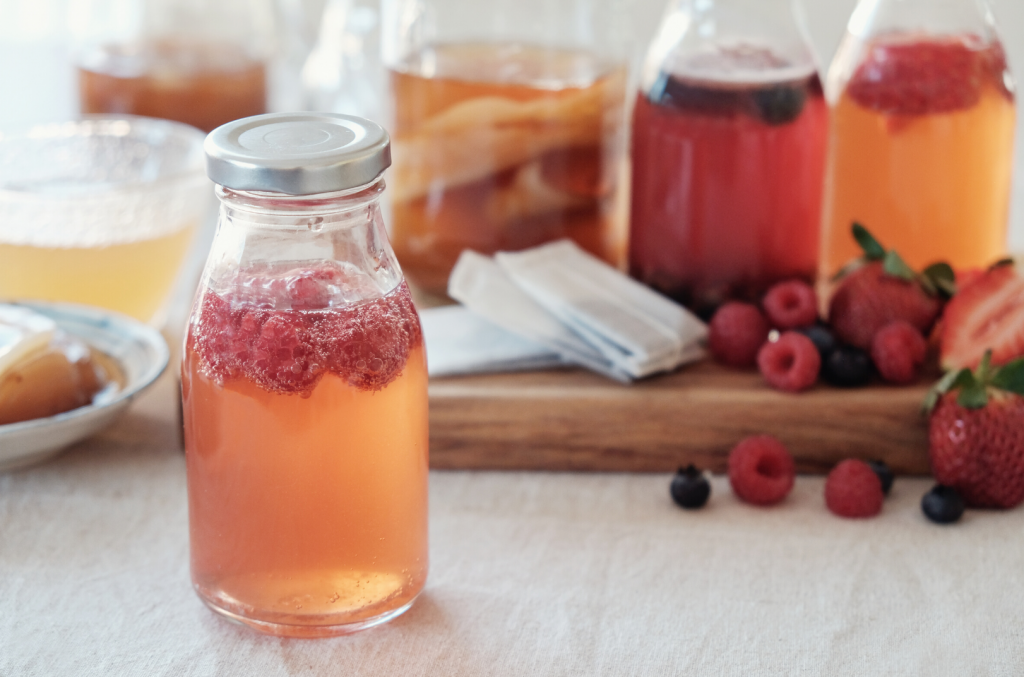
Ingredients:
- 4 cups distilled water
- 2 tablespoons Water Kefir Grains
- ¼ cup unrefined cane sugar
- ½ lemon or lime
- 1 dried fig
- 1 cup fruit or fruit juice
- Optional: other herbs + spices of your choice
Directions:
- Fill a large jar with 4 cups of distilled water (or boiled water).
- Add sugar and kefir grains.
- Top the jar with thin kitchen cloth and seal with a rubber band.
- Keep on counter for 2-4 days, allowing the grains to eat the sugar.
- When it tastes a little tangy, and the sweetness is gone, it’s time for the second fermentation process.
- In another jar, add fig and 1 cup fresh fruit or fruit juice and any other desired spices.
- Strain the water kefir jar into the jar with the fruit and cover with a metal lid.
- After 24 hours, the fruit will float to the surface and you can refrigerate your drink.
Things to keep in mind:
- During the second phase of fermentation, you should check for burping, like in the recipe above, as there is gas buildup. You should open the top slightly to let some pressure out every 6-8 hours.
- You can store the kefir grains used earlier and feed one to two teaspoon of sugar a week until you prepare another batch.
- One way to tell if the kefir is finished is by the dried fig because it gives the grains the minerals they need and it will float to the top when it is finished.
These are just 3 easy at home recipes to get some natural probiotics into your diet. However, there are so many ways you can incorporate more healthy bacteria into your food. This culture starter kit is also an excellent product to use to add probiotics to your food. It can be used for vegetables, whipped butter, sour cream, and more!
There are so many great resources to learn more about how to support your gut. A great resource to learn more about healing the gut and autoimmunity is The Healing Pain podcast by Dr. Tom O’Bryan.
Integrating probiotics doesn’t have to be expensive or time consuming. These recipes are a great place to start for making an easy at home probiotic to support your gut health!
Other sources:
“Easy 2-Ingredient Coconut Yogurt.” Minimalist Baker, minimalistbaker.com/easy-2-ingredient-coconut-yogurt/.
Ezman, Milla. “Full Guide to Wild Fermented Sauerkraut for Gut Health.” Siberian Cedar Land, 24 June 2019, www.siberiancedarland.com/wild-fermented-sauerkraut/.
Fountaine, Sylvia. “Happy Bubbly Kefir Water!” Feasting At Home, 16 May 2020, www.feastingathome.com/water-kefir/.
Jenny. “Water Kefir.” Nourished Kitchen, 17 May 2019, nourishedkitchen.com/water-kefir/.
Tunmise, Sarah, et al. “Fermentation: The Basics.” EatCultured, 22 Feb. 2018, eatcultured.com/blogs/our-awesome-blog/fermentation-the-basics.
